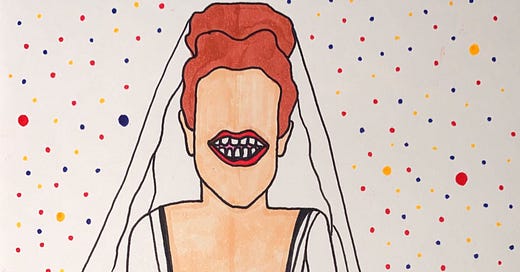She is fashionably late, but she is here.
Also, like the previous issue, she is the first issue of a series. This series is entitled Sad (Girl) Theory (which I shall unpack later), named after Audrey Wollen’s theory of the same name in which she proclaims that women’s sadness is a radical act, among other things. Some titles due to be examined in this vein include Sylvia Plath’s The Bell Jar, Ottessa Moshfegh’s My Year of Rest and Relaxation, Joan Didion’s Play It As It Lays, Carmen Maria Machado’s In The Dream House, Jane Eyre, and other cool and funky stuff. The goal is to have a collection of analyses of Sad Girls akin to a Sylvanian Family - one that seems to sit sulkily upon the shelf gathering just enough dust to glow at golden hour.
(Psst: there’s a Substack Reader App now, and it’s a pretty groovy way to dedicate a digital pocket to newsletters that are usually relegated to our overflowing inboxes.)
I’ve been thinking about being a creative online and exactly what that means. I like spewing my thoughts into the void, and having that void speak back in a meaningful way. I try my best to keep everything categorical and to pepper in the personal without it becoming too overwhelming. That being said, my favourite kind of writing - at least in this sphere - is something along the lines of criticism-cum-creative-non-fiction. So, I’m going to start putting more of myself into my work - whether that be my words, my art, or my music.
I want this newsletter to be more than just a slew of movie reviews. I want to inject it with theory and wit, and treat it like I see other online writers treat their Substack babies: as a journal that one is comfortable having those you know and love peruse. That’s what I wanted to do when I first thought of starting a newsletter a year before I launched this one, but I didn’t know how to do it. I supplemented this desire with separation: Medium is for essays, Substack is for criticism, and Patreon is for paywalled tidbits. I considered making my ‘Highly Recommend’ segment a Patreon-related thing, but my only Patrons at this point in time are my mom and my boyfriend (I love you!), and I want my voice to be available to as many people as possible. I’m still figuring out how to build the structure and schedule of this newsletter with elegance and grace in terms of subsections and the types of content it contains, but I’ll get there. The Good, The Bad, and The Rain Man is getting a makeover.
I have a deep-rooted fear of unintentional theft, whether it be of ideas or traits, and here you will find me rationalising that many people who publish their own newsletters have a recommendations section, and blogs are built on structured oversharing. Writing is a practice, and writing is praxis. But this notion of unintentional theft is reminiscent of many neurodivergent experiences. We’ve seen the memes a la ‘when you walk out of the cinema and adopt the personality of the main character’. This is a fairly common experience, but, on a broader scale, relates to masking. Masking - whether it be one’s autism, queerness, trauma, or personality disorder - is making the best of a bad situation.
Upon rewatching Muriel’s Wedding, it’s evident that this lies at the heart of her character.
Muriel Heslop is an aimless twentysomething whose primary pastimes include listening to ABBA for hours in her room and fantasising about/fixating on weddings. She’s got daddy issues, fake friends, and next to no employment prospects. So what’s a girl to do? Get a blank cheque from your mom to buy a resale cosmetic kit from your dad’s mistress and steal your family’s life savings, of course. Use this money to follow your ex-friends to Hibiscus Island. Reconnect with a high school acquaintance who smokes like a chimney and seems to be the only person who doesn’t see you as nothing. Lip-sync Waterloo with her, and, upon facing the music of your felony at home, move to Sydney with her. Don’t forget to base your personality on a lie, change your name from Muriel to Mariel, and relish in any and every opportunity to escape yourself.
Her character is less than admirable. Pathological lying is an objectively undesirable - if not flat-out reprehensible - trait. But it is understandable.
‘You’re useless.’ ‘You’re embarrassing.’ ‘You can’t type.’ ‘You don’t wear the ‘right’ outfits.’ ‘You don’t do your hair right.’ ‘You aren’t on our level.’
These statements are spat at Muriel by friends and family, offensive and crass in their assault on her person. By all accounts, she sees herself as others see her: the epitome of failure. More specifically, as a failure in the land of women. The only woman who accepts Muriel for who she is, is Rhonda, a woman who is effectively her platonic partner, and it takes her an entire movie to figure out that this acceptance is enough to catapult her towards a path of self-love.
Audrey Wollen’s Sad Girl Theory rests upon the idea that a woman’s sadness (and its physical and emotional implications) can be seen as resistance. Sadness isn’t passive, and Muriel’s misery is too palpable to be seen as such. Wollen asserts that sadness is not an individual ill, but rather a collective experience, and that a woman’s sadness holds a particular flavour. One can taste Muriel’s sadness in billowing wedding dresses, red lipstick, an oversized bottle of champagne, the burnt grass of her father’s garden, and the aftermath of a broken beanbag. In this regard, Muriel’s despair manifests itself as a result of and as a resistance to a lifetime of rejection.
Muriel Heslop/Mariel Van Akel is something of a femme fatale in that, though thoroughly oozing anti-charm (a-la Michael in The Boys in the Band) and lacking in long-term strategy, she is an unstoppable force driven by her need to overcome what she understands to be her failure in womanhood. The key to this success is marriage - not love. Call me ludicrous, but I think that the narrative arc of Muriel’s quest for marriage is a radical choice. Though the position of marriage within this movie is not strictly feminist in that it is still seen as the purpose of a woman’s life (both in terms of the epoch at hand and the views of the protagonist and surrounding characters), there is an air of autonomy in Muriel’s decision to embark upon an obsessive path towards her own big day. The film also doesn’t make the wedding the pinnacle, but rather an aesthetic high-point surrounded by other dramatic circumstances. Muriel’s reinvention marks her ascension of past failure, not the commitment to a man.
Dramas centred around the elusive Feminine Experience are almost always mired in compulsory heterosexuality. Muriel’s Wedding is no exception. This usually plays out under the auspices of a broader issue: we are conditioned and expected to construct our lives around monogamous romantic partnerships. This expectation is amplified for women. Tick, tick, tick, find The One or else you will be lonely and your life will be meaningless. Rhonda’s role as a friend - a consistent, complex, reliable friend at that - adds to the subversion present within this atypical narrative. What is most interesting to note, I think, is that Muriel has reclaimed the expectations of womanhood - specifically the institution of marriage - as a special interest.
I have been thinking about this for a while. The notion of pathologising ‘restricted’ or ‘limited’ interests is complicated. My main issue with certain versions of this paradigm is that it negates the functionality that interests can hold. I haven’t come across that many examples that address the aetiology of special interests. I’ve rambled about a certain dichotomy of special interests before. Within this dichotomy, if you’re going to be seen as weird, you have two options: express an interest that makes it seem that this weirdness is intentional, or express an interest that allows for a greater chance of seeming ‘normal’.
For example, a weird girl whose personality is carefully constructed around interests such as makeup, fashion, and pop music is, within a neurodivergent context, making a pointed effort to gain social acceptance as the ‘right’ kind of girl, just as a weird boy obsessed with football trivia can be seen as the ‘right’ kind of boy, even if his interest in football is seen as overly involved. On the other end of the spectrum, a weirdo whose personality consists of alternative music, androgynous clothing, and defiance is attempting to market their weirdness as an embodiment of counterculture, rather than as an organic facet of their experience of the world. As previously mentioned, I have used this example before, but I think it presents this dichotomy well, and I am going to keep exploring it.
Getting back to Muriel, her obsessions with marriage and ABBA, and her pursuit of her own wedding, are more than a manifestation of special interests: they act as a lifeline. Special interests are not arbitrary. Perhaps some seem to appear out of the blue, but I think that many serve a purpose. Re: the acceptable vs. countercultural example, special interests are functional in both circumstances. Weirdo A wants to fit in, and their interests are expressed so as to foster social approval, whilst Weirdo B, perhaps after botched attempts at fitting in, decide to own their rejection by amplifying it and actively alienating themselves from the status quo.
When Rhonda is learning to walk again, she sighs, ‘How can you stand this?’ (‘this’ being the fact that Muriel has to offer care to her disabled friend, whose narrative is, in my opinion, one of the better narratives of a newly-disabled person; she is sexy and fun and chain-smokes throughout her rehabilitation, surgeries, and adjustment to a different life, which is quite unlike the tragedy that often marks stories of sudden disability apropos Born on the Fourth of July, Million Dollar Baby, Me Before You, or even The People vs. Larry Flynt). Muriel replies by saying that, before she got reacquainted with Rhonda and moved to Sydney with her, she would sit in her room and listen to ABBA songs all day, and that now her life is as good as an ABBA song - as good as Dancing Queen - which means that she doesn’t need to listen to ABBA anymore, at least not in the same way. This speaks to the emergence of special interests as supports for the harshness of the outside world. I take my preoccupation with Tom Cruise as a prime example of a special interest that serves a purpose, and also as one that runs parallel to Muriel’s changing relationship with ABBA. Muriel trying on a dress in every wedding shop she can find in the Yellow Pages and asking the hostesses to take photos for her sick mother or ailed sister (all lies, of course) allows for a sense of purpose and connection, however fleeting or false. Muriel morphs into Mariel, and regresses back to Muriel, largely because she realises that she holds more power than she thinks. After her big white wedding, in the flat of her husband whom she found in the Personals, David asks her why she would go through with marrying someone she doesn’t know. She retorts that he did the same thing, to which he says, ‘I want to win.’ She responds: ‘Me, too.’
Interests - neurodivergent or otherwise - can foster easier social interactions, aid in emotional processing, and provide feelings of safety when you engage with them. Rattling off Tom Cruise trivia made me seem entertaining in my eccentricity, and making lists of his movies in chronological order gave me a sense of purpose, however arbitrary that may seem to an outsider. I have changed in many ways, and, though Tom Cruise lore isn’t as prominent a feature in my life as it used to be, it still has an important place in my heart and brain. Like anything in life, my interest in him and his work ebbs and flows.
Muriel’s Wedding is an iconic, garish, and memorable tragicomedy. There’s something about it that sticks in one’s memory far beyond Waterloo and ‘You’re terrible, Muriel.’ The way that she embroils herself in a life that she so desperately wants to be hers haunts viewers, because we can identify with aspects of her depravity and desire to be a different version of herself. Muriel, we love to cringe at you, and we love you for all your awkward edges.
Watch it on: Google Play, Vudu, or, if you’re like me, your parents’ DVD copy.
Rating: a Super Trouper Sad Girl/10












Share this post